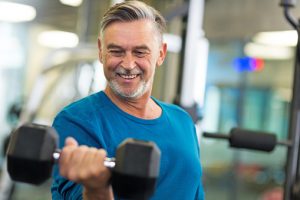
It’s true, aging takes its toll on our muscles. The older we become, the more difficult it is to maintain muscle mass. But, it is not impossible. Study after study shows that we can stay strong at any age. To help you out, here are a few things to keep in mind when it comes to muscle.
What you need to know about your aging muscles
Muscle loss can affect your energy levels. Muscle loss begins around the age of 40. You lose about eight percent of muscle mass per decade, meaning you’re lost 24 percent by age 70. Because you’re not as strong, you get tired more easily, so your energy levels and endurance suffer. So, if you’re struggling with chronic fatigue, it’s time to take care of your muscles.
Muscles are essential for your movement, balance, and posture. Yes, thanks to mainstream media and pop culture, we do associate muscles with strength, bodybuilding, and attractive curves. But muscles have an important function that has nothing to do with looking good. Muscles keep our body upright, enable movement, and keep us grounded. With that said, one of the dangers of excessive muscle loss is the elevated risk of falls and fractures. Our metabolism and the way our body uses up oxygen are also affected by our muscles.
Muscles are your body’s savings account. You need to invest in muscle mass to keep you strong in later-life. It’s like a reserve that you can rely on no matter what. Lack of activity, poor nutrition, and various diseases can take a huge toll on your muscles, Thus, we need to make sure we’ve got enough of muscle mass in case of adversity. The good news is, along with exercise, proper nutrition can help.
Your muscle health depends on your diet. Malnutrition—the insufficient intake of essential nutrients—is not age-specific and can affect anyone at any age. It’s a real problem, as every other senior is at risk for malnutrition or is malnourished when admitted to hospital. And what’s worse is that they don’t even realize it. It’s important to feed your body an adequate amount of protein. Otherwise, it will turn to your muscles as a source of protein—and we don’t want that to happen.
A balanced diet full of macronutrients (protein and carbs) and micronutrients (vitamins and minerals) is what you need to maintain healthy muscles. Beans, nuts, eggs, and cheese are all great sources of protein that will help rebuild your muscles. Take note that as you get older, you need more protein to make up for muscle decline.
One more thing in favor of good nutrition: it will keep you afloat through life’s ups and downs. Eat well, stay active, and embrace all of life’s challenges and adventures with a youthful spirit (and strong muscles).
Related: Simple fix for age-related muscle loss